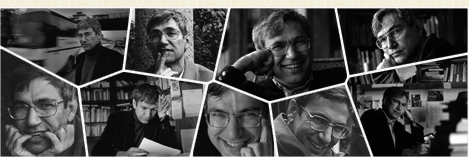Fate or Fiction?
Orhan Pamuk’s Yeni Hayat, reviewed by Maureen Freely in Cornucopia 14
"Yes, I liked it, but what is it about?" That's what people said about The New Life (Yeni Hayat) when it first came out in Turkey. I remember wondering why it was selling faster than any book in Turkish history even though no one knew what to make of it. Now I have read it myself I can see that it was successful because it made people puzzled. This is a book about a man whose life is thrown off course by a book: the conceit wouldn't work if it didn't also make its readers lose their bearings.
The man, Osman, happens onto the book by accident - or so he thinks. He sees in it the hands of a beautiful girl, Janan, whom he has been admiring from afar and decides to buy his own copy so he can know her thoughts. He gets more than he bargained for. "Even on the first page I was so affected by the book's intensity I felt my body sever itself and pull away from the chair... the book worked its influence not only on my soul but on every aspect of my identity. It was such a powerful influence that the light surging from the pages illumined my face, its incandescence dazzled my intellect but also endowed it with brilliant lucidity. This was the kind of light in which I would recast myself; I could lose my way in this light; I already guessed in the light the shadows of an existence I had yet to know and embrace."
And so he sets out to do both. All roads lead to Janan, until she and her boyfriend disappear. Osman tries and fails to find out what's happened to them. Then one day he boards a bus without knowing exactly why. As one bus leads to another, all he knows is that there is no going back. Anatolia whisks past. No sooner has he registered a village than it disappears. As he catalogues the details, he hypnotises the reader in much the same way as the book hypnotised him. It is not long before he finds himself on a bus that is in collision with a cement truck. He describes his first brush with death as a poet might describe the first signs of spring.
He becomes obsessed with all the other bus wrecks he passes. One day a police tip-off leads him to the place where two buses have collided only half an hour earlier - "The magic that makes life meaningful and bearable still hung in the air" - not knowing he is looking for Janan in thewreckage until he finds her.
Without pausing for explanations, the two board another bus. It is showing low-budget films on its TV set. Together they watch one tawdry, over-acted kissing scene after another, but though the distance between them continues to narrow, they do not become lovers. Janan is on her own quest for her own lost lover, Mehmet. She has no leads, but thanks to a series of accidents they find his childhood home. Mehmet's father, still in residence, is a crank philosopher-inventor who thinks his son is dead and has hired a string of "watches" to get to the bottom of the conspiracy that killed him.He invites Osman into his son's childhood bedroom, which turns out to be full of quirky children's adventure stories that Osman remembers from his own childhood: the author is none other than his uncle. It is at this point that the story doubles back on itself to prove that there is no such thing as an accident
But the story is almost beside the point. The book's interests lie elsewhere. In a way The New Life is not a novel but something too powerful to be contained in such a flimsy "foreign toy". Suspended in the gap between life and death, it expresses longings and raptures that owe more to Sufism than any Western tradition. Despite its modernist tricks and its elegant allusions to other novels, its own cadences are closer to poetry. As are its intentions - the way it makes you feel, what it makes you see and remember and regret, matter more than what it might or might not mean. Like Orhan Pamuk's earlier novels, it offers many thoughts on the paradoxes that come with being a Westernised Turk. It evokes what he has called elsewhere "the feeling of being off track, forgotten...that sadness that life lived elsewhere is more mythic, more real than your own pale, shabby imitation-life." By writing a book that captures this sadness, he has broken the spell - andput a uniquely Turkish sensibility at the centre of the world literary map.

